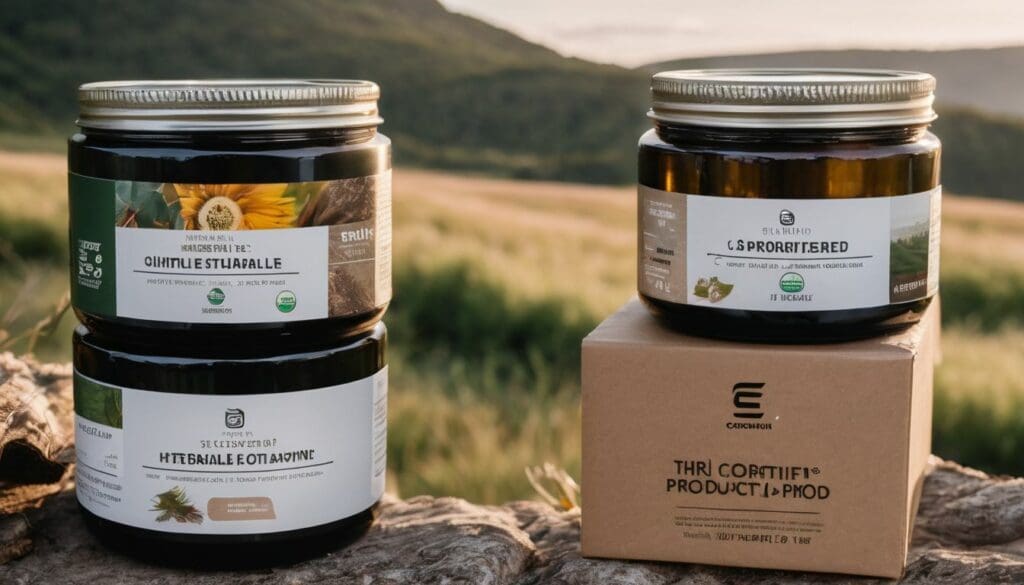Navigating the world of eco-conscious consumption can often feel like a relentless challenge. Like many others, we’ve encountered that sense of exasperation when faced with labels that overpromise and underdeliver.
Through meticulous research, we’ve unearthed a startling truth: third-party certified sustainable product certifications are indeed pivotal—a staggering 80% of consumers place their trust in these verified eco-labels.
We’re here to demystify this complex terrain and champion your efforts to make a tangible difference for our planet. Dive into our straightforward guidance; aligning your choices with environmental integrity is easier than you might imagine!
Key Takeaways
- Sustainable product certification is a stamp of approval by an independent third party, indicating that a product meets certain environmental and social standards. It’s essential for consumers looking to make ethical purchases.
- Certifications like the Forest Stewardship Council (FSC), Fairtrade International, and Cradle to Cradle Certified help identify products made with sustainable practices, benefiting both people and the planet.
- Third-party certifications fight greenwashing by providing verified information on eco-friendliness, which enables consumers to trust in their purchasing decisions and support genuine sustainable efforts.
- Businesses can gain a competitive edge in the market by obtaining sustainability certifications, showing they value responsible practices while also catering to eco-conscious customers.
- Consumers have power; by choosing products with recognised certifications they encourage companies towards more environmentally and socially responsible production, contributing positively to our global future.
What is Sustainable Product Certification?
Sustainable product certification involves third-party validation of a product’s eco-friendly, ethical, and responsible production practices. It helps consumers make informed choices about the products they buy and supports sustainable businesses in the market.
Definition
Sustainable product certification means a product has met specific standards for environmental and social responsibility. It’s a seal of approval from an independent third party that tells us the item in question is made with consideration for people and the planet.
These certifications assess everything from ethical sourcing to responsible production practices.
We look at these eco-friendly labels as solid evidence of green business commitments because they show adherence to stringent industry standards. Certifications help us distinguish genuinely sustainable products from those merely claiming earth-friendliness – a practice known as greenwashing.
When we see fairtrade, ethical, or environmental certification on items, it reassures us that there’s a dedication to sustainability behind them.
Purpose
Sustainable product certification serves as a reliable way for environmentally conscious consumers to identify ethically produced and eco-friendly products. It provides assurance that the item has been responsibly sourced, manufactured using sustainable practices, and conforms to fair trade standards.
By seeking out eco-friendly certification labels such as Fairtrade or green certifications, individuals can actively support conservation efforts and make a positive impact on social change by choosing products with lower environmental impact.
Certifications also help create consumer awareness about the importance of responsible production methods and promote the adoption of sustainable practices across various industries.
Common Certifications for Sustainable Products
Some common certifications for sustainable products include Eco-friendly certification, ethical certification, and Fairtrade certification. These certifications are issued by various certifying bodies to ensure that products meet certain standards and regulations for responsible sourcing and production.
Examples of Certifying Bodies
Sustainable product certification is provided by various certifying bodies. Here are some examples:
- The Forest Stewardship Council (FSC) – FSC provides certification for responsibly managed forests, ensuring the wood products come from sustainably managed sources.
- Fairtrade International – This certification ensures fair prices, living wages, and community benefits for farmers and workers in developing countries.
- Cradle to Cradle Certified – This certification evaluates products based on their environmental and social impact throughout their entire lifecycle, promoting circular economy principles.
Benefits and Limitations
Exploring the plethora of certification bodies gives us a clearer understanding of what makes a product sustainable. Now, let’s delve into the pros and cons of these certifications through an easy-to-read table format.
| Benefits | Limitations |
|---|---|
| Certifications empower consumers with knowledge about a product’s environmental impact. | Certifications can be costly, often presenting a financial barrier for small producers. |
| They provide a competitive edge for businesses in a market that values sustainability. | Diverse certifications can confuse consumers, making it hard to discern which are most credible. |
| Standards help maintain consistent product quality and environmental performance. | Some certifications may have criteria that are too lenient or not sufficiently comprehensive. |
| Endorsements from reputable bodies can build trust between consumers and brands. | The proliferation of eco-labels may lead to skepticism and label fatigue among consumers. |
| They can serve as benchmarks for regulatory bodies and influence policy development. | May focus on a narrow range of issues, overlooking broader sustainability aspects. |
Moving on, it’s crucial to understand how these certifications aid consumers in making informed decisions and fostering sustainable practices.
How Sustainable Certification Can Help Consumers Make Informed Choices
Sustainable certification can help consumers make informed choices by combatting greenwashing and ensuring that products are truly eco-friendly and ethically produced. It encourages sustainable behavior and allows consumers to support socially responsible businesses with third-party validation of their eco-friendly claims.
Combatting Greenwashing
To combat greenwashing, researching certification standards and labels is crucial. Look for reputable certifying bodies that have stringent criteria for eco-friendly products. Educate yourself about the different certification logos and what they represent in terms of sustainability and ethical production.
By doing so, individuals can make informed choices while avoiding falling prey to misleading marketing tactics.
Consumers can also combat greenwashing by staying informed about environmental issues. Supporting businesses with transparent supply chains and a commitment to sustainable practices helps create demand for authentic eco-friendly products.
Encouraging Sustainable Behaviour
To encourage sustainable behaviour, environmentally conscious individuals should look for eco-friendly certifications when making purchasing decisions. By choosing products with third-party validation, such as eco-friendly certification or green labelling, consumers can ensure the authenticity of a product’s sustainability claims.
This action not only supports conservation and environmental efforts but also sends a clear message to businesses that there is a demand for eco-conscious products. Making informed choices based on credible certifications can drive positive change towards a more sustainable future.
Moreover, actively seeking out and supporting products with recognised sustainable certifications can help combat greenwashing in the market. It demonstrates our commitment to making choices that align with our values and encourages others to do the same.
The Future of Sustainable Certification
Trust and transparency will be essential in the future of sustainable certification, as consumers demand more information about the environmental impact of products. Addressing challenges such as consistency and standardisation will also play a crucial role in shaping the future of eco-friendly certifications.
Trust and Transparency
To build trust and transparency, certifying bodies must ensure that the certification process is rigorous and reliable. This means conducting thorough assessments of products to verify their eco-friendliness and authenticity.
Additionally, providing clear information about the criteria used for certification can help consumers understand the standards behind a certified sustainable product. By setting high standards and being transparent about the evaluation process, certifying bodies can instil confidence in environmentally conscious individuals when choosing sustainable products.
Moreover, third-party validation plays a crucial role in ensuring trust and transparency. When independent organisations are involved in assessing and verifying eco-friendly certifications, it adds another layer of credibility to the process.
Addressing Challenges
To ensure the credibility of eco-friendly certifications, we need to tackle the issue of varying standards and criteria across different certifying bodies. Harmonising these standards would provide clarity and consistency for consumers seeking sustainable products.
Additionally, increasing awareness about the importance of third-party validation among businesses is crucial in fostering a culture of authenticity within the eco-friendly market.
Moving forward, it’s essential for all stakeholders – businesses, certifying bodies, and consumers – to work collaboratively towards setting higher benchmarks and holding each other accountable for meeting them.
This collective effort will be instrumental in overcoming the challenges associated with sustainable product certification and pave the way for a more transparent and trustworthy eco-friendly marketplace.
Role of Businesses and Consumers
Businesses play a crucial role in promoting sustainable products by obtaining eco-friendly certifications for their goods. By partnering with reputable certifying bodies, businesses can demonstrate their commitment to environmental conservation and product authenticity, fostering consumer trust and loyalty.
This proactive approach not only encourages sustainability within the industry but also helps consumers make informed choices when purchasing eco-friendly products. It empowers them to support businesses that align with their values, ultimately driving positive change towards a more sustainable future.
Consumers also have an essential role to play in the promotion of sustainable products. By actively seeking out certified eco-friendly products and supporting environmentally responsible businesses, consumers send a powerful message to the market that drives demand for more sustainable options.
Conclusion
In conclusion, sustainable product certification plays a crucial role in guiding environmentally conscious individuals towards eco-friendly choices. It empowers consumers by providing third-party validation and combatting greenwashing practices.
As we look to the future, trust, transparency, and active participation from both businesses and consumers will be essential in shaping the impact of sustainable certifications on our environment.
FAQs
1. What does eco-friendly certification mean for sustainable products?
Eco-friendly certification is a seal of approval that shows a product meets certain environmental standards and is safe for the planet.
2. Why is third-party validation important in certifying products as eco-friendly?
Third-party validation ensures that an independent organisation has checked the product’s sustainability claims, making them more trustworthy.
3. How do certifications impact the choice of sustainable products?
Certifications help customers identify genuine sustainable products, guiding them to make environmentally responsible choices.
4. Can any product get an eco-friendly certification easily?
No, obtaining an eco-friendly certification can be challenging; products must comply with specific sustainability criteria set by certifying bodies.





